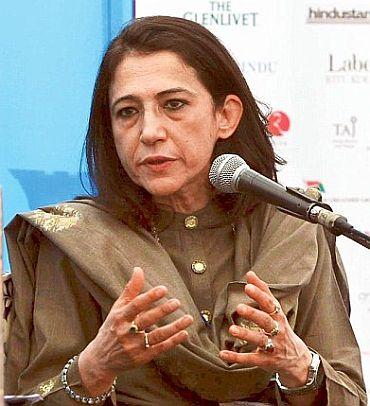 | « Back to article | Print this article |
 One of Pakistan's most acclaimed historians, Ayesha Jalal bemoans the fact that history as an academic discipline has failed to grow in her country, a deficiency that needs to be addressed to spawn a new breed of scholars in the subject.
One of Pakistan's most acclaimed historians, Ayesha Jalal bemoans the fact that history as an academic discipline has failed to grow in her country, a deficiency that needs to be addressed to spawn a new breed of scholars in the subject.
A professor of History at the Tufts University with as many as seven books to her credit, the Pakistani-American who is an authority on South Asia has chosen to return to Pakistan as a visiting scholar to help address the gap in her own way.
In India to attend the Jaipur Literature Festival, Jalal told PTI during an interaction why she felt that the academic growth of history in India had contributed to the development of a worthy scholarship in this country.
"Of course, there are biases and political agendas too, but India has continued to teach history, as a result of which you have historical scholarship coming from India," she said.
"I was bemoaning the fact that in Pakistan history has suffered as an academic discipline, and is not taught as is the way in India," she said.
Jalal's books include 'The Sole Spokesman' and 'Democracy and Authoritarianism in South Asia' -- works that have tried to trace the history of the subcontinent including the origins and the tortured legacy of the partition.
She has also co-authored Modern South Asia: History, Culture and Political Economy with her husband Sugata Bose, a book that is considered perhaps the first joint exercise by an Indian and a Pakistani in dissecting the history of modern South Asia.
A grand niece of eminent Urdu writer Saadat Hasan Manto, Jalal returns to Pakistan from her base in the United States as a visiting professor at the Lahore University of Management Sciences.
"In my own modest way, I am trying to address this issue by teaching history in Pakistan," she said.
The author, whose last book Partisans of Allah: Jihad in South Asia traced the discourse on jihad in South Asia over centuries, strongly believes that the Taliban has lost support among the people and that Pakistan is a country that is politically more resilient than many would believe.
"The Arab Spring has reinforced the fact that the people are prepared to take up structures of state. In Pakistan, despite military regimes, no ruler has survived more than 11 years, forget about 30 or 40 years. I think Pakistan is politically more resilient than many people believe, all it needs is a chance," she said.
However, she believes the issues -- of pervading injustice and inequity -- that have contributed to Al Qaeda's rise will have to be addressed to put an end to violence.
The emergence of Imran Khan on Pakistan's political horizon has made many people take note of the former cricketer's potential, and Jalal feels it has a lot to do with the prevailing disenchantment and yearning for a change.
"There is a lot of disenchantment in Pakistan, there is anti-incumbency what Indians know very well. Imran Khan's popularity has much to do with it. People are looking up to him for a change," she says.